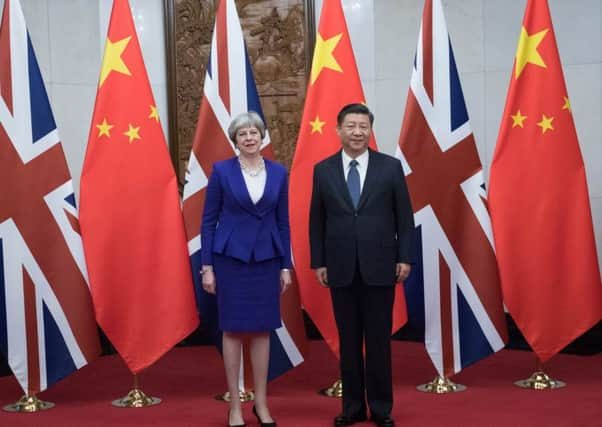William Wallace: As brexit looms, has it all been worth it?


Time and again, disagreements within the Conservative Party and Government have led the Prime Minister to put off awkward choices, leaving businesses in Britain uncertain about future investment, and the governments of other European states waiting impatiently for UK proposals.
The transitional agreement pushes negotiations on our future relationship off further, with Britain still following EU rules for another 20 months without taking part any longer in defining them.
Advertisement
Hide AdAdvertisement
Hide AdJacob Rees-Mogg is right to say that this will make Britain a ‘vassal state’. But he has no alternative suggestions to make about how to manage our exit.
The 2016 referendum posed a simple question.
But the details of any future relationship from outside the EU are complicated and technical.
Many in the Leave campaign suggested that Britain could go back to the relationship it had with France, the Netherlands and others in 1972, before the 45 years we have spent negotiating common regulations and institutions with our neighbours.
The European single market, which Margaret Thatcher fought to create, created the conditions for Easyjet and Ryanair to grow – with benefits that British citizens now take for granted, yet risk losing.
Advertisement
Hide AdAdvertisement
Hide AdEU agencies have developed to regulate food safety, medical treatments and drugs, the transport of nuclear isotopes and the pursuit of criminals and terrorists across borders.
Disentangling our health service, police, air traffic control, as well as supply chains for complex manufacturers from the continent without severely damaging our national prosperity and safety is proving damaging – and expensive.
The Government has allocated £3bn to expand the civil service to cope with leaving the EU (money that could have been spent on the NHS or schools). More will be spent on recreating UK agencies to replace those we shared with our neighbours, for which we shared the costs.
The Leave campaign promised that ‘independence’ from the EU would be easy, and that Britain would remain inside the single market and the customs union.
Advertisement
Hide AdAdvertisement
Hide AdSince the referendum, they and the Conservative Right have insisted that we must leave both, without explaining the implications of doing so. Liam Fox and David Davis told us that we would have free-trade agreements with other major countries by the time we left the EU.
But instead of the fellow travellers for a free-trading world they looked for, President Trump is putting up trade barriers, the Indian government has made clear that it will expect greater freedom for migration to Britain in return for more open trade and China sees the UK as weaker outside the EU.
A Foreign Secretary who claimed that the EU presents the greatest threat to British sovereignty is now calling for European solidarity against Russian attacks on British soil.
In an increasingly hostile world, with the threat of a trade war between the United States and China, an aggressively hostile Russia, and every summer a rising number of desperate migrants crossing the Mediterranean to look for safety in open European societies, Boris Johnson’s promise that once we leave the EU we will rediscover our freedom and prestige as ‘Global Britain’ looks dangerously silly.
Advertisement
Hide AdAdvertisement
Hide AdThe PM’s Mansion House speech three weeks ago showed how far she has now moved from her post-Referendum optimism. Mrs May told her audience – and the Brexit supporters in her own Cabinet – that ‘we all need to face up to some hard facts’. She admitted that leaving will lessen British influence and access to our largest overseas market.
She also proposed that Britain should remain associated with several EU agencies, should pay a continuing subscription for the advantages they will provide, and accept the European Court of Justice as an arbitrator in the sectors they cover.
And she called for a new security and defence treaty with EU members, to retain the advantages we have gained through close co-operation on international issues.
If this sounds incoherent, it’s because the divisions within the Conservative Party remain deep, and many right-wing Brexiteers still refuse to engage with the detailed examination of where Britain’s long-term national interests lie.
Advertisement
Hide AdAdvertisement
Hide AdOnly in the last few weeks has the Cabinet begun to discuss what sort of final agreement we wish to reach with the EU – and Ministers are nevertheless declaring that we will now complete negotiations on the full range of complex issues by this October.
Meanwhile, Ministers have been told that reshaped controls at the UK’s borders will not be ready in time for the end of the transition period in 2020, and the question of how to keep the Irish border open while leaving the customs union and the single market hangs in the air.
Our Government has wasted the 20 months since the referendum in internal squabbles, leaving too little time to clarify our future relationship before we give up our place in the EU Council.
For the hard-line Brexiteers, little else matters beyond ‘freeing’ the UK from European ‘domination’, whatever the cost to the economy or Britain’s place in the world.
Advertisement
Hide AdAdvertisement
Hide AdFor the Prime Minister, looking at those costs and at the darkening international context beyond the European Union, it’s now hard to avoid the awkward question underlying this costly and badly-managed exit process: ‘Is it really worth it?’
William Wallace is a Liberal Democrat peer, scrutinising the EU (Withdrawal) Bill as it moves through the Lords.